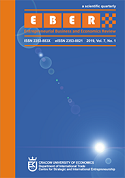Performance vs. Family Ownership and Management: The Case of Portuguese Wine Firms
Performance vs. Family Ownership and Management: The Case of Portuguese Wine Firms
Author(s): Luis PachecoSubject(s): Business Economy / Management, Micro-Economics, Agriculture, Family and social welfare
Published by: Uniwersytet Ekonomiczny w Krakowie
Keywords: ownership structure; financial performance; family firms; agency theory; stewardship theory; wine industry;
Summary/Abstract: Objective: The objective of this article is to empirically examine the relationship between firms’ ownership and control structure and their financial performance. The literature about performance determinants is abundant, however, the relation between performance and ownership and control structure in the context of family firms (FF) is much less studied. Research Design & Methods: The article is focused on Portuguese wine firms due to their increasing importance in the Portuguese economy. A Unbalanced panel data of 117 firms for the period from 2011 to 2016 were used and a random effects model was applied. Findings: The degree of family involvement shows a U-shaped relationship with performance, meaning that those firms where the family does not hold the majority in the board should be open to receive external managers with greater knowledge and experience and increase their internal competencies in order to enhance performance. However, the same is not true when the family has already a majority position in the board. Implications & Recommendations: Firms willing to attain better performance should have boards either primarily composed of external managers, potentially more independent or, preferably, mostly composed of family members, with their interests fully aligned. One implication for FF owners, when the family does not have the majority in the board, is the need to reduce family presence in it, opening the board to non-family members, albeit that decision could ultimately depend on the family members’ competencies. Contribution & Value Added: In the light of the agency and stewardship theories, this article extends the literature providing an application to a less studied sector and country.
Journal: Entrepreneurial Business and Economics Review
- Issue Year: 7/2019
- Issue No: 3
- Page Range: 7-24
- Page Count: 18
- Language: English

